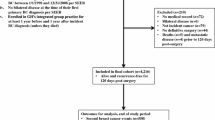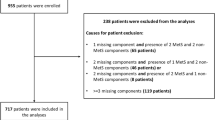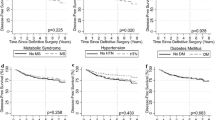Abstract
Metabolic syndrome (MS), conventionally defined by the presence of at least three out of five dysmetabolic traits (abdominal obesity, hypertension, low plasma HDL-cholesterol, high plasma glucose and high triglycerides), has been associated with an increased risk of several age-related chronic diseases, including breast cancer (BC). This may have prognostic implications for BC survivors. 2,092 early stage BC survivors aged 35–70, recruited in eleven Italian centres 0–5 years after surgical treatment (1.74 years on average), were followed-up over 2.8 years on average for additional BC-related events, including BC-specific mortality, distant metastasis, local recurrences and contralateral BC. At recruitment, 20 % of the patients had MS. Logistic regression models were carried out to generate OR and 95 % confidence intervals (CI) for new BC events associated with MS, adjusting for baseline pathological prognostic factors. New BC events occurred in 164 patients, including 89 distant metastases. The adjusted ORs for women with MS versus women without any MS traits were 2.17 (CI 1.31–3.60) overall, and 2.45 (CI 1.24–4.82) for distant metastasis. The OR of new BC events for women with only one or two MS traits was 1.40 (CI 0.91–2.16). All MS traits were positively associated with new BC events, and significantly so for low HDL and high triglycerides. MS is an important prognostic factor in BC. As MS is reversible through lifestyle changes, interventions to decrease MS traits in BC patients should be implemented in BC clinics.
Similar content being viewed by others
References
De Angelis R, Sant M, Coleman MP et al (2014) Cancer survival in Europe 1999–2007 by country and age: results of EUROCARE-5-a population-based study. Lancet Oncol 15:23–34
Edwards BK, Noone AM, Mariotto AB et al. (2013) Annual Report to the Nation on the status of cancer, 1975–2010, featuring prevalence of comorbidity and impact on survival among persons with lung, colorectal, breast, or prostate cancer. Cancer. doi:10.1002/cncr.28509
De Angelis R, Tavilla A, Verdecchia A et al (2009) Breast cancer survivors in the United States: geographic variability and time trends, 2005–2015. Cancer 115:1954–1966
International Agency for Research on Cancer (IARC) 2012 EUCAN http://eco.iarc.fr/EUCAN. Accessed 8 May 2014
Alberti KG, Eckel RH, Grundy SM et al (2009) Harmonizing the metabolic syndrome: a joint interim statement of the International Diabetes Federation Task Force on Epidemiology and Prevention; National Heart, Lung, and Blood Institute; American Heart Association; World Heart Federation; International Atherosclerosis Society; and International Association for the Study of Obesity. Circulation 120:1640–1645
Kassi E, Pervanidou P, Kaltsas G, Chrousos G (2011) Metabolic syndrome: definitions and controversies. BMC Med 9:48
Agnoli C, Berrino F, Abagnato CA et al (2010) Metabolic syndrome and postmenopausal breast cancer in the ORDET cohort: a nested case-control study. Nutr Metab Cardiovasc Dis 20:41–48
Esposito K, Chiodini P, Colao A, Lenzi A, Giugliano D (2012) Metabolic syndrome and risk of cancer: a systematic review and meta-analysis. Diabetes Care 35:2402–2411
World Cancer Research Fund, American Institute for Cancer Research (2007) Food, nutrition, physical activity and the prevention of cancer: a global perspective. AICR, Washington
Protani M, Coory M, Martin JH (2010) Effect of obesity on survival of women with breast cancer: systematic review and meta-analysis. Breast Cancer Res Treat 123:627–635
Cheraghi Z, Poorolajal J, Hashem T, Esmailnasab N, Doosti IA (2012) Effect of body mass index on breast cancer during premenopausal and postmenopausal periods: a meta-analysis. PLoS ONE 7:e51446
Villarini A, Pasanisi P, Traina A et al (2012) Lifestyle and breast cancer recurrences: the DIANA-5 trial. Tumori 98:1–18
Haftenberger M, Lahmann PH, Panico S et al (2002) Overweight, obesity and fat distribution in 50- to 64-year-old participants in the European prospective investigation into cancer and nutrition (EPIC). Public Health Nutr 5:1147–1162
Istituto Superiore Sanità (ISS) (2013). Progetto Cuore—http://www.cuore.iss.it. Accessed 8 May 2014
Verdecchia A, Sant M, Gatta G, Micheli A, Berrino F, ITACARE Working Group (1997) Survival in adult Italian cancer patients, 1978–1989. Tumori 83:39–425
Matthews DR, Hosker JP, Rudenski AS, Naylor BA, Treacher DF, Turner RC (1985) Homeostasis model assessment: insulin resistance and beta-cell function from fasting plasma glucose and insulin concentrations in man. Diabetologia 28:412–419
Contiero P, Berrino F, Tagliabue G et al (2013) Fasting blood glucose and long-term prognosis of non-metastatic breast cancer: a cohort study. Breast Cancer Res Treat 138:951–959
Goodwin PJ, Ennis M, Pritchard KI et al (2012) Insulin- and obesity-related variables in early-stage breast cancer: correlations and time course of prognostic associations. J Clin Oncol 30:164–171
Minicozzi P, Berrino F, Sebastiani F et al (2013) High fasting blood glucose and obesity significantly and independently increase risk of breast cancer death in hormone receptor-positive disease. Eur J Cancer 49:3881–3888
Borugian MJ, Sheps SB, Kim-Sing C et al (2003) Waist-to-hip ratio and breast cancer mortality. Am J Epidemiol 158:963–968
Kumar NB, Cantor A, Allen K, Cox CE (2000) Android obesity at diagnosis and breast carcinoma survival: Evaluation of the effects of anthropometric variables at diagnosis, including body composition and body fat distribution and weight gain during life span, and survival from breast carcinoma. Cancer 88:2751–2757
Vatten LJ, Foss OP (1990) Total serum cholesterol and triglycerides and risk of breast cancer: a prospective study of 24,329 Norwegian women. Cancer Res 50:2341–2346
Strohmaier S, Edlinger M, Manjer J et al (2013) Total serum cholesterol and cancer incidence in the metabolic syndrome and cancer project (Me-Can). PLoS ONE 8:e54242
Fagherazzi G, Fabre A, Boutron-Ruault MC, Clavel-Chapelon F (2010) Serum cholesterol level, use of a cholesterol-lowering drug, and breast cancer: results from the prospective E3N cohort. Eur J Cancer Prev 19:120–125
Hiatt RA, Friedman GD, Bawol RD, Ury HK (1982) Breast cancer and serum cholesterol. J Natl Cancer Inst 68:885–889
Manjer J, Kaaks R, Riboli E, Berglund G (2001) Risk of breast cancer in relation to anthropometry, blood pressure, blood lipids and glucose metabolism: a prospective study within the Malmo preventive project. Eur J Cancer Prev 10:33–42
Melvin JC, Seth D, Holmberg L et al (2012) Lipid profiles and risk of breast and ovarian cancer in the Swedish AMORIS study. Cancer Epidemiol Biomarkers Prev 21:1381–1384
Schatzkin A, Hoover RN, Taylor PR et al (1988) Site-specific analysis of total serum cholesterol and incident cancer in the national health and nutrition examination survey I epidemiologic follow-up study. Cancer Res 48:452–458
Tornberg SA, Holm LE, Carstensen JM (1988) Breast cancer risk in relation to serum cholesterol, serum beta-lipoprotein, height, weight, and blood pressure. Acta Oncol 27:31–37
Furberg AS, Veierod MB, Wilsgaard T, Bernstein L, Thune I (2004) Serum high-density lipoprotein cholesterol, metabolic profile, and breast cancer risk. J Natl Cancer Inst 96:1152–1160
Hoyer AP, Engholm G (1992) Serum lipids and breast cancer risk: a cohort study of 5,207 Danish women. Cancer Causes Control 3:403–408
Kucharska-Newton AM, Rosamond WD, Mink PJ, Alberg AJ, Shahar E, Folsom AR (2008) HDL-cholesterol and incidence of breast cancer in the ARIC cohort study. Ann Epidemiol 18:671–677
Gaard M, Tretli S, Urdal P (1994) Risk of breast cancer in relation to blood lipids: a prospective study of 31,209 Norwegian women. Cancer Causes Control 5:501–509
Bahl M, Ennis M, Tannock IF et al (2005) Serum lipids and outcome of early-stage breast cancer: results of a prospective cohort study. Breast Cancer Res Treat 94:135–144
Largent JA, Bernstein L, Horn-Ross PL et al (2010) Hypertension, antihypertensive medication use, and breast cancer risk in the California teachers study cohort. Cancer Causes Control 21:1615–1624
Peeters PH, van Noord PA, Hoes AW, Fracheboud J, Gimbrere CH, Grobbee DE (2000) Hypertension and breast cancer risk in a 19-year follow-up study (the DOM cohort). Diagnostic investigation into mammarian cancer. J Hypertens 18:249–254
Nechuta S, Lu W, Zheng Y et al (2013) Comorbidities and breast cancer survival: a report from the Shanghai breast cancer survival study. Breast Cancer Res Treat 139:227–235
Braithwaite D, Tammemagi CM, Moore DH et al (2009) Hypertension is an independent predictor of survival disparity between African–American and white breast cancer patients. Int J Cancer 124:1213–1219
Bjorge T, Lukanova A, Jonsson H et al (2010) Metabolic syndrome and breast cancer in the me-can (metabolic syndrome and cancer) project. Cancer Epidemiol Biomarkers Prev 19:1737–1745
Capasso I, Esposito E, Pentimalli F et al (2010) Metabolic syndrome affects breast cancer risk in postmenopausal women: national cancer institute of Naples experience. Cancer Biol Ther 10:1240–1243
Kabat GC, Kim M, Chlebowski RT et al (2009) A longitudinal study of the metabolic syndrome and risk of postmenopausal breast cancer. Cancer Epidemiol Biomarkers Prev 18:2046–2053
Maiti B, Kundranda MN, Spiro TP, Daw HA (2010) The association of metabolic syndrome with triple-negative breast cancer. Breast Cancer Res Treat 121:479–483
Healy LA, Ryan AM, Carroll P et al (2010) Metabolic syndrome, central obesity and insulin resistance are associated with adverse pathological features in postmenopausal breast cancer. Clin Oncol (R Coll Radiol) 22:281–288
Duggan C, Irwin ML, Xiao L et al (2011) Associations of insulin resistance and adiponectin with mortality in women with breast cancer. J Clin Oncol 29:32–39
Berrino F, Pasanisi P, Bellati C et al (2005) Serum testosterone levels and breast cancer recurrence. Int J Cancer 113:499–502
Goodwin PJ, Ennis M, Pritchard KI et al (2002) Fasting insulin and outcome in early-stage breast cancer: results of a prospective cohort study. J Clin Oncol 20:42–51
Micheli A, Meneghini E, Secreto G et al (2007) Plasma testosterone and prognosis of postmenopausal breast cancer patients. J Clin Oncol 25:2685–2690
Allin KH, Nordestgaard BG, Flyger H, Bojesen SE (2011) Elevated pre-treatment levels of plasma C-reactive protein are associated with poor prognosis after breast cancer: a cohort study. Breast Cancer Res 13:R55
Pierce BL, Ballard-Barbash R, Bernstein L et al (2009) Elevated biomarkers of inflammation are associated with reduced survival among breast cancer patients. J Clin Oncol 27:3437–3444
Villasenor A, Flatt SW, Marinac C, Natarajan L, Pierce JP, Patterson RE (2013) Postdiagnosis C-reactive protein and breast cancer survivorship: findings from the WHEL study. Cancer Epidemiol Biomarkers Prev 22(1):32–41
Chlebowski RT, Blackburn GL, Thomson CA et al (2006) Dietary fat reduction and breast cancer outcome: interim efficacy results from the women’s intervention nutrition study. J Natl Cancer Inst 98:1767–1776
Esposito K, Marfella R, Ciotola M et al (2004) Effect of a mediterranean-style diet on endothelial dysfunction and markers of vascular inflammation in the metabolic syndrome: a randomized trial. JAMA 292:1440–1446
Acknowledgments
We thank the Associazione Vita e Salute, the Fondazione Edo Tempia, the Italian League Against Cancer of Asti and of Busto Arsizio, and the Mantua ASL for logistic support, and dr Penci MT for language support.
Funding
The DIANA-5 study was financed by the Italian Department of Health, Programma Integrato Oncologia (PIO, RFPS-2006-1-339715), and by the Associazione Italiana per la Ricerca sul Cancro (AIRC, IG-2011-11942).
Conflict of interest
All Authors declare no conflict of interest
Author information
Authors and Affiliations
Corresponding author
Appendix
Appendix
The DIANA-5 working group include the authors and the following: Alessiato A, Amerio ML, Carretto R, Gavazza C, Lanfranco C, Micca GM, Piccarolo C, Rabino V, Sterpetti S, Tessa M, Testore F, Piccillo D, Pittarello E (Asti). Paduos A, Allegro G (Biella). Belloti E, Palestra M (Busto Arsizio). Anghinoni E, Arvati M, Bottura P, Chiesa M, Di Marco A, Iridile C, Manzato F, Orsini O, Pecini E, Prati C, Villani P, Volta F (Mantova). Aristarco V, Macis D, Passoni C, Sabbatini A, Serrano D, Varricchio C, Zagallo E (Milano European Institute of Oncology). Alquati E, Angarano A, Bellegotti E,Cavalleri A, Cogliati P, Consorti P, Curtosi P, Di Mauro MG, Ferrante L, Fornaciari G, Guerrini MG, Larossa M, Maule A (Milano National Cancer Institute). Belfiore A, Chiodini P, Cioffi E, d’Agostino MA, Santucci de Magistris M, Gentile M, Giallauria F, Mancini M, Mattiello A, Vigorito C, Vitelli A (Napoli). Campisi I, Dolcemascolo C, Staiti R (Palermo). Bianco T, Pera A, Pirovano DM, Pisanu G, Premori M, Premori P, Rainieri S, Soldi E. (Piacenza). del Riccio L, Napolitano D (Potenza). Bellati C, Feira S, Finocchiaro E, Pezzana A, Ponti A, Rizzi A, Segnan N (Torino).
Rights and permissions
About this article
Cite this article
Berrino, F., Villarini, A., Traina, A. et al. Metabolic syndrome and breast cancer prognosis. Breast Cancer Res Treat 147, 159–165 (2014). https://doi.org/10.1007/s10549-014-3076-6
Received:
Accepted:
Published:
Issue Date:
DOI: https://doi.org/10.1007/s10549-014-3076-6




